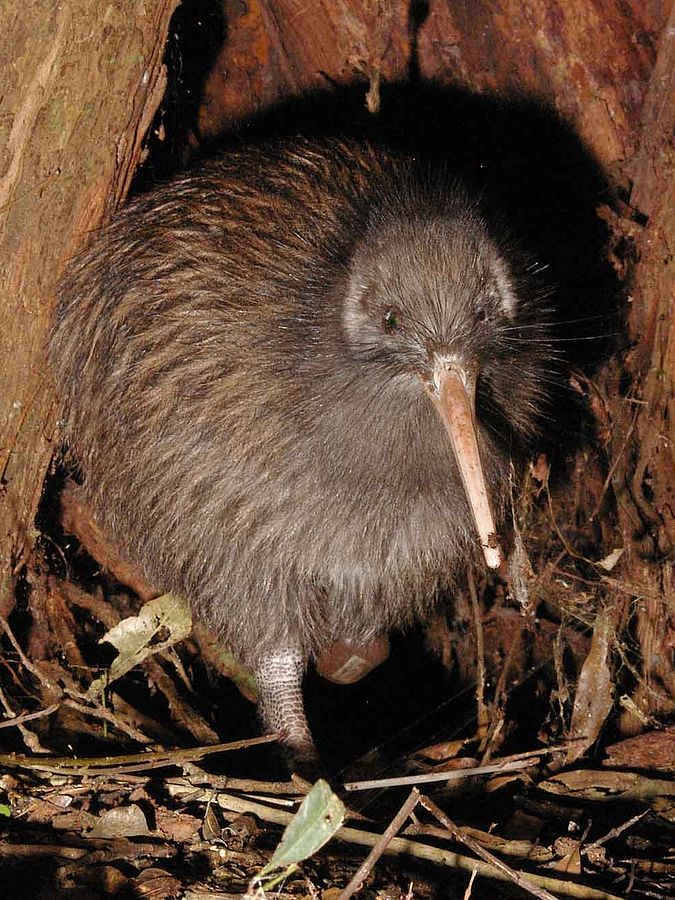News
2 kiwi birds are rare bright spot in grim extinction report

FILE: Te Tuatahi a nui, a male kiwi on Maungatautari mountain. (North Island brown kiwi, Apteryx mantelli). In early 2007 a transmitter attached to Te Tuatahi a nui, which gives staff valuable information about his health, indicated that the five year old is sitting on an egg, a first for this ecological reserve. With North Island brown kiwi the female lays the eggs while the male has responsibility for them during the 85 days of incubation. (Photo By Maungatautari Ecological Island Trust – http://www.maungatrust.org/news/default.asp, Public Domain)
TOKYO — Two types of New Zealand kiwi birds are a rare bright spot in a mostly grim assessment of global species at risk of extinction.
The International Union for the Conservation of Nature upgraded the Okarito kiwi and the Northern Brown kiwi from endangered to vulnerable thanks to New Zealand’s progress in controlling predators like stoats and cats.
But the conservation group’s latest update Tuesday mostly reported grave threats to animals and plants due to loss of habitat and unsustainable farming and fisheries practices.
The group said the Irrawaddy dolphin and finless porpoise that roam coastlines of Southeast Asia are now designated as endangered, imperiled by entanglement in fishing nets and other human activities.
For its Red List of Threatened Species, the group assessed the status of 91,523 species, of which 25,821 are threatened, 866 are extinct and 69 extinct in the wild. It said 11,783 species are vulnerable, 8,455 are endangered and 5,583 critically endangered.
Behind the numbers are life-and-death struggles for survival as human populations grow and industrialize and habitats are transformed by global warming.
Australia’s Western Ringtail possum has slipped from vulnerable to critically endangered, the IUCN said, as its population plunged by 80 per cent over the past decade.
Once widespread in peppermint and eucalyptus forests of Western Australia, now it has only a few fragmented habitats and is prone to heat stress at temperatures above 35 C (95 F) that are becoming increasingly common where it lives.
The group said three reptile species on Christmas Island, also in Australia, had gone extinct in the wild: the Whiptail-skink, the Blue-tailed skink and Lister’s gecko. The group said the losses of reptiles were mysterious but might be due to introduction of a disease and the arrival of the yellow crazy ant.
The IUCN and Global Invasive Species Database list that ant as one of the 100 worst invasive species. The creature has wreaked havoc on Christmas Island, devouring the famous endemic red crabs that were a key part of its ecosystem.
Apart from many animal species the IUCN said many wild crops, such as wild wheat, rice and yam, face threats from overgrazing, use of herbicides and urbanization.
The kiwi, however, has gained ground thanks to a New Zealand campaign to rid its islands of all its rats, possums and stoats. More than 40 species of New Zealand birds already have died out and many others remain threatened, including the iconic kiwi.
The modest recovery of the Okarito kiwi, whose numbers have grown from 160 in 1995 to 400-450 now, offers hope such efforts can help protect the species and others under threat.
The IUCN reported its findings in Tokyo to reflect support from Toyota Motor Corp., which helps fund species assessments. It said a third of 46 newly assessed endemic species of lizards and snakes in Japan were threatened by factors such as habitat loss, collection for pet stores and the introduction of invasive species.





















